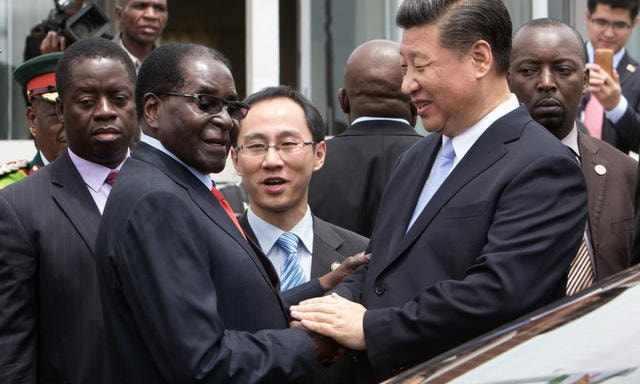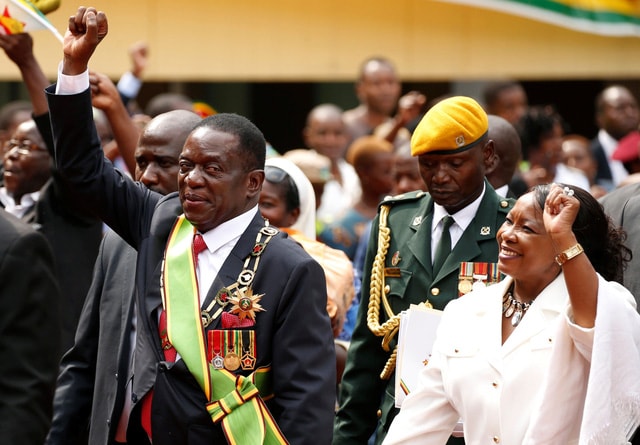Zimbabwe newspaper accuses China of orchestrating coup
It is clear that China has a great influence on Zimbabwe both economically and politically. Even the recent coup is said to have had the hand of Beijing. However, the influence on this African country is not only China.
 |
| Mr Mugabe welcomed Chinese President Xi Jinping to Harare in 2015. Photo: AFP |
China and Zimbabwe have had a longstanding friendship, with Beijing standing by leader Robert Mugabe and his Zanu-PF party as they ended white-minority rule in 1980 until Harare faced Western sanctions in the early 2000s over its land reform program.
China's shadow
The visit to China by army chief General Constantino Chiwenga just before the coup looked like the final part of a complex plan that had been hatched since Emmerson Mnangagwa was sacked as vice president.
"We respect Mr. Mugabe's decision to step down. He remains a good friend of the Chinese people." Beijing spokesman |
"If you are wondering why we are not calling it a coup and why the military is going easy on the man who made them tear their hair out, the simple answer is that it was at China's request," wrote the Zimbabwe Mail.
Beijing is said to have approved the coup on the condition that no one would be killed and that Mr Mnangagwa would take power, according to CityPress sources.
In return, Beijing was asked to continue providing “economic and technical assistance” to Harare. “China not only acquiesced, it pulled all the strings,” the Zimbabwean newspaper asserted.
Meanwhile, Chinese analysts also assert that Beijing is always watching Zimbabwe's internal struggles and carefully considering its options.
The man China is betting on - "Crocodile" Mnangagwa, known for his quiet personality and sudden "snaps", who received military training in China since the 1970s - is close to General Chiwenga.
Once a loyal aide, Mr. Mnangagwa was seen as a threat by leader Mugabe when he ran for vice president in 2004. In 2005, Mr. Mugabe chose Ms. Joyce Mujuru, wife of military general Solomon Mujuru, as vice president and demoted Mr. Mnangagwa.
"The old man (Mugabe) is too worried about his legacy. Emmerson Mnangagwa is the only one capable of taking power. He is an intelligence chief with the characteristics of a veteran, has ties to the military and is backed by China," a Zimbabwean military general commented.
In 2008, a failed coup by several army generals left General Solomon under house arrest and Ms Joyce ousted. That year, despite hyperinflation and widespread violence, Mr Mugabe remained firmly on the throne.
"Change horse"
China, Africa’s largest investor, has more political influence in Zimbabwe than any other country in the world, thanks to the huge sums Beijing has poured into Harare’s mining, agriculture, energy and construction sectors.
However, the relationship between the two countries became closer since Beijing provided support to Mr. Mugabe's forces in the 1970s.
When Harare was sanctioned after the 2002 elections, China invested more than 100 projects in Zimbabwe and blocked the UN arms embargo on the country. In response to criticism that the Mugabe government was a puppet of China, Beijing spent billions of dollars on health and infrastructure programs to win over the people.
However, the policies of old friend Mugabe in recent years, such as the 2016 nationalization law that does not allow foreign companies to own more than 49% of businesses located in Zimbabwe, have made Beijing worried about billion-dollar investments.
"I think many Beijing officials will be happy that Mr. Mugabe is gone," said China-Africa relations expert Ross Anthony.
Analysts say China’s support for the new “warhorse” Mnangagwa is also seen as learning from previous crises in Africa. In 2011, the decision to support Libyan leader Muammar Gaddafi to the end caused China serious losses when oil contracts worth billions of dollars were torn up by the new government.
Meanwhile, new President Emmerson Mnangagwa promises to be a factor that benefits Beijing. Chinese media portrays the new Zimbabwean leader as trustworthy, close to China, having studied Marxism and military engineering in Beijing and Nanjing.
Chinese President Xi Jinping congratulated new President Mnangagwa on November 24. "China values its friendship with Zimbabwe and is willing to work together to strengthen bilateral relations and bring benefits to the people of both countries," Xinhua news agency quoted a Chinese spokesman as saying.
 |
New President Emmerson Mnangagwa, China's new but not-so-new friend. Photo: REUTERS Japan-China competitionIn the wave of investment in Africa, Japan and China have emerged as a pair of counterweights, according to a 2016 Brookings Institution study. At the end of August 2016, the 6th Tokyo International Conference on African Development (TICAD VI) was held in Nairobi, Kenya. This was the first time TICAD was held in Africa since its establishment in 1993. Japanese Prime Minister Shinzo Abe at that time pledged to invest 30 billion USD to support African development in 3 years. In response to that move, the Chinese Foreign Ministry accused Japan of "trying to impose its will on African countries to achieve selfish interests and cause animosity between China and African countries" - quoted by the Brookings Institute. For a resource-scarce country like Japan, Africa is a rich and reasonable international resource market. In addition, Japan has made no secret of its intention to promote the international role of African countries, in order to reap benefits for Tokyo's agenda at the United Nations. In 2016, Zimbabwean President Robert Mugabe and his wife visited Japan. During this visit, Japan always affirmed that it "never imposed sanctions or any measures on Zimbabwe". On the contrary, Japan was the most enthusiastic country in helping Zimbabwe apply for one of the two African seats in the United Nations Security Council. |
According to tuoitre.vn
| RELATED NEWS |
|---|


